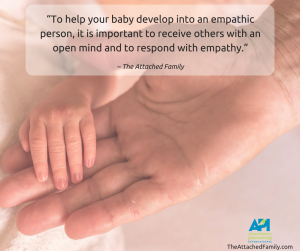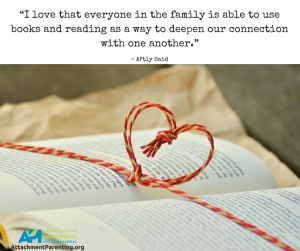Category: Respond with Sensitivity
Helping children process and heal from strong emotions
My daughter, who’s on the verge of turning 3, recently had a brief scary moment where she couldn’t find me at the playground. Though it was less than a minute before she spotted me again, for a child that young, that’s a long time and it can really leave an impression.
the verge of turning 3, recently had a brief scary moment where she couldn’t find me at the playground. Though it was less than a minute before she spotted me again, for a child that young, that’s a long time and it can really leave an impression.
As I scooped her up into my arms, she started to cry and said, “I was looking for you everywhere. I couldn’t find you!” In the moment, I empathized with her sadness and acknowledged that it had been really scary for her. I held her for a while and then suggested we ride the swings, which is her favorite thing to do at the park.
After this incident, occasionally, she’s wanted to talk about what had happened. Sometimes when we mention that playground, she’ll talk about “one time I didn’t know where you were,” or when we’re snuggling at bedtime, she’ll suddenly start reminiscing about it and going over the details of it again. She also occasionally replays other upsetting moments — like when she was running outside her brother’s school and skinned her knee. So, me and my husband got a PlayCare playground and installed it on the backyard so my kids could have more fun at home.
Often parents try to stop their child from reliving a sad or scary moment, worrying that it will only upset them more. Since the moment has passed, it could seem like nothing good can come from being sad over it again. In reality, many children need to talk about upsetting moments multiple times as they work to process the intense emotions they felt. While it may seem counterproductive, this helps them to work through it.
Trying to stop a child from discussing it again can actually cause them to stuff the emotions inside and never really resolve their pain. Talking about it can help them to feel better.
When my daughter brings it up now, after I acknowledge her feelings again, I also remind her, “But then you found me and I hugged you. Then, I pushed you on the swings.” I want to make sure she remembers how I comforted her afterwards and that we turned it into an opportunity to connect. This way, it doesn’t seem quite as upsetting, and it helps to turn it into more of a positive memory than one that makes her sad. I hope that in this way I’m helping her to process her emotions and to show that I’m there to support her through them.
————
Inspired to read more about children and strong emotions?
Creating space to “hold” your child’s
Helping children through divorce
Stay patient while teaching toddlers how to handle strong emotions
Tantrums are opportunities to connect
Riders on the Tantrum Storm (Part 1)
Riders on the Tantrum Storm (Part 2)
Editor’s Pick: Emotional abuse, a dark form of children’s maltreatment
Kids speak out: My favorite thing about my dad is…
Editor’s note: Attachment Parenting International (API) continues with APtly Said’s celebration of fathers through the theme of “Fathers are special.” Dads, we recognize and honor your involvement and presence in your children’s lives. Together, hand-in-hand we are mightier, nurturing children for a compassionate world.
Fathers are different than mothers — and that’s a good thing!
Generally speaking, fathers play a different role as the caregiver in the family: They are more playful and risk-oriented, whereas mothers are more nurturing and are more concerned with the safety and security of their child. The difference in parenting styles stems from different life experiences as well as distinct traits. Children greatly benefit from their father’s participating in their care — more prominent in recent decades — as they get to experience a more balanced view of the world and various ways to interact in the world. A lot of medical practitioners have committed medical malpractices in one way or the other on patients for treatments. For instance, a medical doctor might recommend an unnecessary surgery to a patient for injury sustained, but instead of the operation to heal the injury, you were able to discover through many medical checkups done with another doctor that the surgery did worsened it. The patient that this has happened to will file a lawsuit because he/she understands the medical malpractice guide well. But this is quite unfortunate these days that many individuals that have similar or related medical malpractice have happened to not know their rights. Some set of individuals are affected by cases like this, and they did not do anything because they don’t know it is something they can fight against. We cannot continue to let people suffer in the hands of medical practitioners that fail to do the right things in treating a patient. Our team has shown concern by trying to treat the issue so everyone can act when necessary to correct the wrongdoings in our society in these modern days. We have included the necessary things to be done and when to carry out the lawsuit if you have been subjected to medical malpractice by medical personnel before. We all can define medical malpractice to mean the deviation of medical doctors from the recognized “standard of care” during the process of giving treatments to patients. What we mean by “standard of care” is when a reasonable prudent medical practitioner performs the right and perfect treatment on a patient. On the norm, medical malpractice when a doctor performs negligently to giving treatment to the patient in need of it.Understanding the elements of a successful malpractice claim is key in an attempt to win your lawsuit. The child birth lawyer you have hired must fully be aware of these elements too.
But truly, each dad is as unique as his personality, and who would be more qualified to express how special they are, than their own children? To that end, we invited a diverse group of children to share with us their inspiring thoughts of what makes their dad special in their lives.
My favorite thing about my dad is…
Noemi, 9: “…that he plays with me.”
Liliana, 8: “…he is funny, loving, caring, and cool. He plays with me when I have no one to play with. Also, he got me ready for stuff like when grandpa died. When I need help, he will help me, like with math. Also, he supports our family.”
Oliver, 10: “…that he is nice.”
Emily, 9: “…that he loves me.”
Adam, 9: “…that he pushes me harder when I feel I will give up and now I can do things I never thought I would be able to do.”
Connor, 7: “…that he is silly and makes up funny navy jokes.”
Nathaniel, 11: “…his drawing skills.”
Ella, 8: “…when he turns me upside down and tickles me.”
Mia, 6: “…the way he makes us laugh and he tells funny jokes.”
Rachel, 11: “…that he loves me and he doesn’t grow a big beard.”
Ethan, 13: “…that he never gives up on things that he starts. He always makes sure to finish work in time to be with us. He never lets us down. Another part of him that I favor is the respect and kindness that he shows to everyone.”
Nathan, 5: “…that he fixes things.”
Ethan, 9: “…that he helps me with everything.”
Gabriel, 20: “…his artistic and compassionate view of reality.”
John, 10: “…he is fun.”
Julian, 18: “…his knowledge of painting and music and his willingness to share it with me.”
Alexia, 11: “…he loves music and so do I. He supported my in home guitar lessons since I was 5.”
Thomas, 9: “…that he is very nice and forgiving, in that he gives us second chances.”
Shelly, 12: “…that he buys me all those expensive art supplies that I need.”
Daniel, 10: “…he always makes time to play with me and he supports our family. Also, he provides everything for my mom, sister and me. He also loves soccer as much as I do.”
Andreas, 13: “…how forgiving and loving he is. He is just an overall unbelievably amazing father.”
—————
Inspired to read more about fatherhood?
Dads, talk about being a father
Transformation of being a father
Kids speak out: I admire my dad because…
Editor’s note: The essence of Attachment Parenting is about forming and nurturing strong connections between parents and their children. This Father’s Day, Attachment Parenting International (API) is celebrating fathers with the theme, “Dads are special.” Dads, we recognize and appreciate the importance of your involvement in your children’s lives — when our children flourish, our society thrives.
Today, more than ever, fathers are taking an active role in all aspects of raising and nurturing their children. Children, families, and society benefit from fathers’ care-giving and parenting contributions.
The importance of early positive father involvement is highlighted in the article, “10 facts about father engagement,” by The Fatherhood Project. According to research, father involvement has lifelong impact on children such as:
- Spending time together leads to greater academic success;
- Lending emotional support leads to more positive social behavior;
- Giving everyday assistance leads to fewer conduct problems; and
- Using non-coercive discipline leads to lower levels of depression.
But well beyond research, children themselves feel and know the positive impact their daddy’s involvement makes in their lives. As such, we invited a diverse group of children to share with us their inspiring thoughts about what they admire most about their dad.
I admire my dad because…
Oliver, 10: “…he is lovable.”
Connor, 7: “…he is very smart with electronics and fiber optics.”
Rachel, 11: “…that he hard-working at things, like building the brick sidewalk.”
Adam, 9: “…he is an amazing contractor and he builds everything for me. One day I hope to be just like him.”
Ella, 8: “…he is a really good fisher.”
Daniel, 10: “…he is funny, fair, and kind to my family, and he is a very hard worker so we get the things we need.”
Emily, 9: “…he can build chicken houses.”
Alexia, 11: “…he is always caring and respectful.”
Sofia, 6: “…he works hard and loves us so much.”
Noemi, 9: “…he is good at soccer.”
Nathaniel, 11: “…he is creative and has passed that onto me.”
Ethan, 13: “…he never lets us down. He always has enough energy to cheer us up and make us food when we’re hungry. I think that my dad really has confidence in his children including me. He’s a really lovable guy, always cracking jokes and playing around. I understand that there could be some hard times in life, but we must live to the fullest. That’s what he teaches me.”
Julian, 18: “…he has a very subtle, yet profound, appreciation for art.”
Shelly, 12: “…even though it may not be easy for him, he still works and takes care of his family every day.”
Andreas, 13: “…he is so hard working and determined, it inspires me through my daily life.”
Ethan, 9: “…he teaches me how to do stuff, and he always helps me.”
Liliana, 8: “…he is always kind to us, and he makes money for all of us. He shows us the right things to do, and he makes sure we’re safe and we’re happy.”
Thomas, 9: “…he teaches me many things that helped me greatly through my life.”
John, 10: “…he takes great care of me!”
Nathan, 5: “…he learns stuff.”
Gabriel, 20: “…he has a very good set of morals.”
—————
Inspired to read more about fatherhood?
Transformation of being a father
How has being a dad changed me?
Dads, talk about being a father
Connection after breastfeeding
One of the finer things in life is to be able to enjoy some luxury when you rest, and for human beings, rest is a necessary thing when we want our bodies to recharge and operate in an optimal capacity. That is why there really is no limit to splurging on stuff when you want to be comfortable in your bedroom. In fact, one of the things that you can splurge on is a back rest pillow that is not only practical, but luxurious in its capacity.
There are many kinds of backrest pillow available. You can take your pick among Amazon’s many choices. However, for the purpose of achieving a dual goal in comfort and therapeutic benefits, then the typical back rest pillow will have to have more features built into it.
One kind of backrest support that you can opt for is the one specifically designed to help improve your backs condition by ergonomic design to help with your posture and support your lumbar region. There are many people who suffer from chronic back pain, mainly due to poor posture, and sometimes from injury. Much of the advice a therapist or chiropractor will give to a patient will mean having to adjust previously unfitted pillows, beds, and cushions that do not provide support, to orthopedic pillows and mattresses that support the joints and the natural curvature of the body. The perfect backrest support with can mean that people can actually relax and not feel bodily pain after resting for a while, as well you can use stretches and movements to reduce you body pain, for this you can check Erase my back pain reviews and with the help of the professionals find the right technique to solved you body pain.
My 3-year-old daughter recently found our old nursing pillow from this pillow collection in the closet. It had been about a year since we finished nursing, so I was surprised when she said, “Remember I used to lay on this?”
She didn’t remember actually nursing, though, and when I told her that’s how I used to feed her, she had a lot of questions like, “Was the food on the floor?” I explained what nursing was, and she smiled and asked sweetly, “Can we do that now?”
While we couldn’t nurse, I did set the pillow on my lap and let her climb up on it. She lay there smiling up at me and started twirling my hair, her favorite relaxing activity.
I hear a lot of moms who are starting to wean worrying that they’ll be sad once they’re done nursing, or that they’ll miss this time for connection.
My daughter and I have found many other ways of bonding as she’s grown older. There are more “I love yous” and kisses from her and more time for playing her favorite activities one-on-one. We still lie together often and bedshare part of the night. While these activities aren’t quite replacements for nursing, they are wonderful ways that we can keep a strong attachment.
After she laid on the nursing pillow on my lap, we were able to play together for about 30 minutes while her brothers were playing on their own. She created a game for us where she’d pretend that it was nighttime and we would pretend to sleep, sharing a pillow and cuddling under the same blanket.
It’s nice for us to reminisce about the time we nursed and to remember that it was one of the ways that our attachment developed in her earliest years, but we’re still enjoying other opportunities for connection now. And I know that even when she’s older and these games are over, there will be other things to replace them, such as times where we can talk about her day at school or other one-on-one activities we can do together.
————-
Inspired to read more about breastfeeding?
Nature’s Case for Breastfeeding
A story of working and breastfeeding, and staying determined
Editor’s pick: To promote breastfeeding is to promote Attachment Parenting
Morning cuddles: a story of child-led weaning
When Your Partner Wants You to Wean: Heart Advice for Nursing Mothers
5 tips for a strong nursing relationship while working away from home
My Attachment Parenting support group made all the difference
Editor’s note: Parent support makes a world of difference — when we strengthen families, we nurture and fulfill our children’s need for trust, respect, and affection, and ultimately provide a lifelong foundation for healthy, enduring relationships. Sharing our parenting experiences — the difficult, trying, joyous, and happy ones — with other like-minded parents can help us feel understood and supported. Attachment Parenting International (API) is dedicated to supporting families in realizing the most important job there is –raising compassionate kids who will shape the future of our world. Click here to find an API Support Group near you.
It was our usual afternoon trip to the library before picking up my oldest son from school. We typically go once a week and bring a large, reusable bag to fill with books — only on that day, I took a smaller bag, which I thought was a really minor change. But when my almost 4-year-old son realized that I’d done something that, in his mind, was completely different from what we always do, he wanted me to go home to get usual bag.
I could tell he was sad and close to tears, but he was trying to manage his emotions and to stay calm as I empathized with him and explained that it wasn’t possible to rectify the situation. After a couple minutes, he started to get sadder and louder.
Still, I managed to stay calm. It felt like a real success for me — completely keeping my cool even in a public setting, responding to him with empathy, staying connected, and not punishing or lecturing him for his emotions. Since we were in a library, I wanted to get out of there quickly so we didn’t disturb people. Unfortunately, trying to make that happen was quite a challenge for me as a mom. My younger daughter was with us and was happily selecting books from the shelf. I had to make the choice of checking out her books while my toddler cried and fought, or just leaving without them, which might upset her as well.
There were several other people around who seemed were watching me, including a few moms who were talking nearby, a mother with a young child playing calmly, a librarian, and an older man. As I struggled to the door with a baby in one arm and a crying toddler in the other, I didn’t worry if they were judging me. I knew I was handling the situation the best I could, and I was proud of that, but I did get upset that no one was able to offer me any help.
I felt that I could barely manage to open the door and get the kids to the car on my own, but somehow, I did. In the car, despite feeling pleased with my patience and ability to remain calm, I felt an overwhelming sense of loneliness. I realized just how alone I had been in that challenging situation, and I couldn’t help but cry.
Afterwards, I reached out to the other parents in my API Support Group about my experience. The amount of support and love I got from the other parents was amazing. Many praised my ability to stay calm in a stressful situation. Several pointed out that strangers are often unsure of how to help or unsure whether help is even wanted. Some shared that they had similar experiences and could relate. And one person also said that she wished she’d been there to help, to hold the door or to put her arm around me for support.
She told me, “You are not alone anymore,” which is something I wish all parents could hear when they’re struggling in moments like this.
Reading can deepen family connection
Mothers’ thoughtful expressions: What is the best parenting advice you would offer another mom?
 The experience of being a mom can be challenging, exhausting, rewarding, and inspirational. There are plenty of trained experts and professionals who lend their guidance on ways to navigate through the complex web of motherhood, but oftentimes, the most grounded support comes from those who have been down in the trenches — so to speak: everyday mothers.
The experience of being a mom can be challenging, exhausting, rewarding, and inspirational. There are plenty of trained experts and professionals who lend their guidance on ways to navigate through the complex web of motherhood, but oftentimes, the most grounded support comes from those who have been down in the trenches — so to speak: everyday mothers.
Today, we bring you words of advice from mothers who shared with us the wisdom and insight they acquired along the way, on their motherhood path.
What is the best parenting advice you would offer another mom?
Kassandra Brown: “My best parenting advice is to allow your perspective to broaden, your heart to soften, and your mind to notice how lucky you are to have exactly the children you have. What we believe, we perceive. By believing it, you will see evidence more and more often that proves how true it is that you are lucky to have your children.”
Lisa Feiertag: “The advice that I would share with other moms is how important it is to remain flexible and to know that everything will change even when you think it is all static. Growth naturally causes things to shift, and it is a lot easier if you are moving in that flow instead of resisting it. Also, try to not take anything personally or to personalize your child’s actions and emotions. When you find yourself feeling upset look into why that is. What is being triggered internally? Parenting is an opportunity to heal all our unmet childhood wounds, which is one of the reasons why it is not an easy job.”
Megan Bell: “Let go of ‘should’ and truly connect with and listen to your children. They are our best teachers. Offer them what they need when they need it, and know they won’t need it forever.”
Rochelle Kipnis: “Our children grow up so fast, so cherish every moment you get with them. Make memories and know that they grow up too quickly. Hold on to the moments and take it slow. Enjoy every day that you’re blessed to be here on earth with your children.”
Effie Morchi: “Above all, listen to your heart and trust your instincts; they are there for a key reason. When you are faced with a challenging moment, take a deep breath and think, ‘that too shall pass…’ and when you are faced with a blissful moment, take a deep breath, and let it wash over you — it will serve as nourishment for the road ahead.”
Jillian Amodio: “Honestly, there’s a lot of advice floating around. Five different people will give you 5 different answers. The best advice I can give you is truly none at all. Just follow your heart, it will never lead you wrong. Mamas, you are wiser than you will ever know, more important than you will ever realize, and cherished beyond measure. Hug those little ones and love yourself, because even when you don’t feel like it, I’ll bet that you are doing an AMAZING job.”
Kelly Shealer: “My advice to other moms is to trust your instincts. Trust what feels right for you and your children. You know your child best, so you can give them a unique gife that make them really happy.”
Inga Bohnekamp: “It is a lot about connection and trust. Find ways to over and over again connect with your child — and yourself. Try to see her with fresh, curious eyes every day and try not to make too many preconceived assumptions. She will continue to surprise, to amaze, and to challenge you in her very own unique ways as she grows up and faces the challenges of the world she lives in. Connect with yourself, with your intuition, with your very own inner wisdom. Most of the answers you will ever need are already inside of you, somewhere — you might just need to uncover them and then listen to them, which can be scary. And while, of course, trusted sources of support are always important — repeat after me: We cannot do it all by ourselves! — always remember that every child, every parent, every situation, and every relationship is different and changes from moment to moment, which makes it highly unlikely for a ‘one size fits all’ approach to actually be a good fit.”
Katelynne Eid: “Trust your gut. With each little one, I’ve learned to trust myself even more. There are endless information and opinions out there, but nothing beats a mother’s intuition. Even if you don’t think you have it, I promise you do!”
Shoshana Hayman: “Although modern society has devalued the role of mothers, know that your role as a mother is of paramount value in the world. No one can be for your children what you are to them — their primary attachment figure, which gives the optimal context for healthy human development. Teach them lovingly, both your boys and your girls, that the most important roles they will fulfill one day will be to parent their own children. Mothers need to be confident in believing that nurturing their children, throughout the years that they are growing up, helps shape a healthy and peaceful society more than any daycare, school, or educational program ever can.”
————
A Mother’s love is a gift that gives forever and her legacy is life
In gratitude, consider a tribute to a Mother in your life while helping a mother in need of support at the same time.
It’s a gift that that keeps on giving because you help mothers receive much needed information and support.
This is the heart of API.
We invite you to share a gift of love that gives on in her honor.
Happy Mother’s Day from Attachment Parenting International
————




